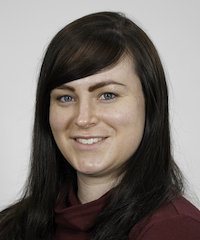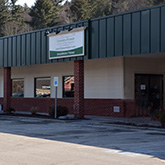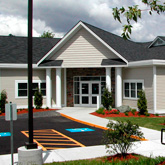At Central Vermont Medical Center our certified therapists are trained to meet the needs of patients who are affected by Urinary/Fecal Incontinence and Constipation.
10 million Americans are affected by incontinence—the inability to hold urine or feces due to loss of pelvic muscle control, loss of pelvic sphincter control or due to a spinal lesion. Individuals living with bowel and bladder disorders are often embarrassed and will limit their recreational activities, social interactions, intimate relationships, and more.
Our Rehabilitation Therapy department has three certified therapists to meet the needs of this community. These therapists were all trained by Janet Hulme, PT, who is nationally known for her work in bowel and bladder health and pelvic pain.
Beyond Kegels provides patients with an option that has demonstrated long-term results and an educational component that will empower individuals to self-manage symptoms.
Who Has Pelvic Floor Weakness?
The pelvic muscles can become weak with aging, during pregnancy, after delivering a child vaginally, after an injury, after a surgery, with chronic coughing, or from a lack of exercise.
In addition, the Beyond Kegels program can be helpful to:
- children experiencing bed-wetting
- women during menopausal years
- men after radical prostatectomy surgery
- men with benign prostate hyperplasia
- individuals experiencing pelvic pain
Types of Incontinence
The two most common types of urinary incontinence are stress incontinence and urge incontinence. With stress incontinence you may leak urine when you cough, laugh, walk, go up stairs, sneeze or get up from a chair. With urge incontinence you may leak large amounts with a sudden uncontrollable need to toilet.
Fecal incontinence is a less common form of incontinence, but does affect about 8% of adults in the US. It is typically treated with a series of simple exercises and dietary changes. Constipation, the other end of the spectrum, is another form of bowel dysfunction which can be due in part to overactive pelvic floor muscles. It is also treated with simple, yet different exercises than fecal incontinence, and dietary changes.
Kegel exercises have been taught for years to strengthen the pelvic floor muscles to help regain control of urine flow. A new program has been developed that’s proven to be more effective called "Beyond Kegels."
Beyond Kegels
The Beyond Kegels program is a non-surgical treatment for treating bowel and bladder health issues.
The basis of Beyond Kegels is that the muscles in the pelvic region need to be balanced, just as they would in any other region of your body. If there is an imbalance in the pelvic muscles, then there may be difficulty in controlling bowel and bladder functions.
The treatment includes exercises that are specific to the pelvic muscles to decrease leaking, the use of biofeedback (a system that detects muscle activity through a sensor that is inserted vaginally or anally), keeping a bladder or bowel diary, and, occasionally lifestyle changes (such as decreasing caffeine intake).
How Do I Get Treatment?
To schedule an initial evaluation, a referral is needed from a primary care physician. If appropriate, testing may need to be done by a urologist before physical therapy intervention can begin.
After evaluation, treatment is typically scheduled 1-2 x a week for approximately 4 weeks. Treatments are carried out in a private room in a one-on-one setting.
See Also: Pelvic/Abdominal Pain
 Physical Therapist
Physical Therapist Physical Therapist
Physical Therapist Physical Therapist
Physical Therapist Physical Therapist
Physical Therapist

CVMC Rehabilitation Therapy - Berlin
Phone
Fax
802-371-5350
Hours
Monday:
CVMC Rehabilitation Therapy - Barre
Phone
Fax
802-225-5770
Hours
Monday:
CVMC Rehabilitation Therapy - Northfield
Phone
Fax
802-485-6116

